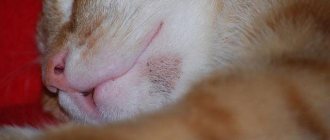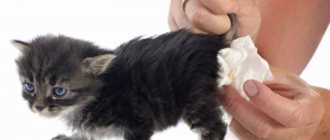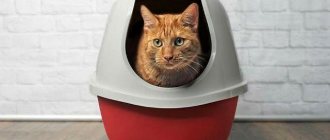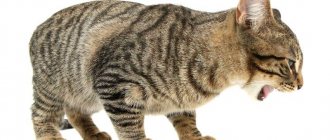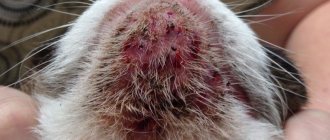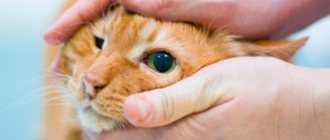In animals, as well as in humans, digestive disorders are quite common. As soon as your cat eats “something wrong,” he begins to have liquid feces and other “delights” that indicate severe indigestion. As a rule, everything “miraculously” passes within a few hours or one day. If there is no improvement and, moreover, the cat has diarrhea with mucus, you need to be wary. Such symptoms always indicate the presence of quite serious pathologies.
General information
Diarrhea (popularly called diarrhea) is a digestive disorder that requires mandatory treatment. With each bowel movement, the pet's body loses a large amount of fluid, weakens and becomes depleted. If not treated promptly, diarrhea can lead to the death of the animal.
Diarrhea is often accompanied by nausea, abdominal pain, and vomiting. The animal experiences discomfort, anxiety, stress. He loses his appetite.
Diarrhea in a cat: how to properly treat an upset stomach
Diarrhea may also be accompanied by:
- fever;
- flatulence;
- fatigue, lethargy;
- nausea;
- vomiting;
- bloody discharge.
Diarrhea is not an independent pathology, it is only a symptom of existing health problems in your pet.
First aid
As soon as the cat has loose stools and the number of bowel movements per day exceeds 3, the animal needs to be given first aid.
Therapeutic fasting
First of all, access to food is limited.
After the onset of diarrhea, it is useful for the animal to fast - this reduces the load on the digestive tract and accelerates the removal of toxins from the body.
Tray Access
The cat's litter box should remain clean, regardless of the number of bowel movements per day. A box with filling is placed near the animal.
Fixing decoctions
On the first day, it is useful to give the cat a restorative decoction. It can be chamomile (acts as an antiseptic), St. John's wort (relieves inflammation), oak bark (fixes).
1 tbsp. l. any herb is poured with a glass of boiling water, the liquid is simmered in a water bath for 15 minutes. Afterwards, wrap the container, let it brew and cool. The finished broth is poured into the pet’s oral cavity, 1 tbsp. l. three times a day.
Contacting a veterinarian
If the diarrhea does not stop, or the animal gets worse, then you need to call a veterinarian at home . A specialist will examine the pet and find out the cause of this condition. Treatment is prescribed only after diagnosis.
Pharmacy products
To treat diarrhea in cats, it is recommended to use drugs created for humans.
In case of poisoning, Enterofuril can be used. This is a broad-spectrum antimicrobial drug. It is prescribed for bacterial and viral infections.
Bifidumbacterin helps restore intestinal microflora. The probiotic is effective for intestinal disorders of any etiology.
Activated carbon is a sorbent that removes toxins from the body. It is used for short-term and uncomplicated diarrhea. In this case, Smecta also helps.
What is the cause of diarrhea in cats?
The causes of diarrhea in a pet can be situational, arising from errors in care, or serious, due to diseases of varying severity.
Household factors leading to disruption of the gastrointestinal tract and diarrhea:
- incorrect diet - feeding your pet fatty, smoked foods, raw fish, milk;
- overfeeding;
- a sharp change in the usual diet - replacing the natural method of feeding with dry food, changing food from wet to dry or vice versa;
- drinking water - a sudden change in the composition of water can adversely affect digestion;
- food poisoning – eating spoiled food;
- food allergies to certain foods;
- the cat’s body’s reaction to medications;
- postoperative recovery period;
- stress – the general condition of a cat in response to a change of environment, a trip, another animal, the absence of the owner;
- short-term diarrhea occurs in cats during pregnancy and after birth.
Among the diseases whose symptom is diarrhea are:
- bacterial infections - salmonella, E. coli and others;
- viruses - rotavirus, feline leukemia, peritonitis, panleukopenia and others;
- liver damage;
- pathologies of the digestive system, pancreatitis, intestinal obstruction;
- serious intoxication of the animal’s body due to poisoning;
- metabolic disorders, incl. diabetes;
- the presence of internal parasites - worms, worms, roundworms;
- oncological diseases;
- kidney disease;
- mycoses (fungal infections) of animals.
You can determine the specific cause of diarrhea in a cat by knowing the types of diarrhea.
Types of diarrhea and diagnosis
In what cases do you need to urgently contact a veterinarian?
It is necessary to stop all activities performed at home and urgently go to a veterinary hospital in the following cases:
- If your pet has eaten something dangerous, for example, a poisonous house plant or household chemicals. In this case, it is necessary to do gastric lavage.
- The following symptoms should cause concern: weakness, pallor of the mucous membranes, incessant thirst, large amounts of greenish feces, which may contain mucus or blood. The kitten may experience a rise in temperature, seizures, and loss of body weight. The pet vomits several times a day.
- When loose stools with mucus occur more than 5 times a day.
Types of diarrhea and diagnosis
The color, consistency and smell of diarrhea differ in each case and allow an accurate diagnosis to be made.
Diagnosis of stool by consistency
The consistency and presence of various inclusions in the stool make it possible to determine the problem organ:
- vomiting with foam and loose stools are symptoms of food poisoning;
- feces with mucus are the result of damage to the large intestine, while the cat often strains to no avail;
- diarrhea with blood - the result of infection or internal parasites;
- watery diarrhea is a symptom of mild poisoning or a disease without damage to the intestines.
Diagnosis of stool by color
The color of feces most fully allows you to determine the problem with your pet’s health:
- yellow diarrhea signals an incomplete digestive process; food has not been digested sufficiently;
- black stool is the result of taking iron-containing drugs, an excessively “meaty” diet, severe damage (bleeding) of the small intestine;
- green diarrhea is formed as a result of rotting processes of spoiled food in the intestines;
- white color indicates the absence of bile in the stool as a result of pathologies of the biliary tract;
- orange color is an indicator of liver problems, severe intoxication of the cat’s body.
Signs of the most dangerous diseases are inclusions of blood and mucus, black, white and orange stool. In these cases, contacting a veterinarian should be done immediately.
Methods for treating diarrhea in cats
Diarrhea as a symptom of the disease
Diarrhea with mucus in a cat can occur due to diseases of the internal organs, infectious diseases, and gastritis.
Liver pathologies
Liver diseases are difficult to diagnose in the early stages. If diarrhea is accompanied by other alarming symptoms, it is necessary to send your pet for a full veterinary examination.
What happens to an animal if there are abnormalities in the liver:
- weight loss;
- lack of appetite;
- yellowing of the gums and whites of the eyes;
- thirst;
- diarrhea and vomiting.
The cat's urine darkens, and fluid begins to accumulate in the abdominal cavity.
Gastritis
Inflammation of the gastric mucosa is called gastritis. Symptoms of the disease in cats are not specific, they are similar to signs of general intoxication of the body:
refusal of food;- thirst;
- vomiting after eating;
- loose stool.
In a chronic course, the signs may be blurred, and the disease develops over several years.
Treatment methods
Self-selection of medications is highly discouraged and is dangerous for the pet’s life. A veterinarian can make the correct diagnosis.
Treatment at home
Treatment at home is possible for mild illnesses or as a correction for mistakes in caring for the animal.
So, if diarrhea is caused by a stressful situation, you should provide the animal with rest, and, if possible, eliminate the cause of anxiety.
If you have an unhealthy diet, you need to take a more responsible approach to compiling your cat’s diet and eliminate possible allergens. Be sure to remove any spicy, fatty or fried foods and dairy products from the animal’s menu. You cannot feed your cat spoiled foods and sweets, because... this leads to poisoning.
Diarrhea during pregnancy is short-lived, no more than 3 times. If the specified amount is exceeded, diarrhea may indicate problems in the cat that require the intervention of a veterinarian.
Diarrhea after childbirth and other operations is short-lived and goes away on its own, because... caused by a stressful situation.
If there are household factors causing diarrhea, as well as with mild diarrhea without dangerous accompanying symptoms, a cat can be cured by fasting.
A fasting diet carried out throughout the day will relieve the digestive system. Dietary restrictions will give the cat's body the opportunity to heal on its own. It is important to note that a strict diet only concerns food. You should not deprive a sick pet of fresh water.
Due to the peculiarities of digestion, a cat cannot starve for more than a day, as this will unnecessarily weaken the animal.
After finishing the diet, you should not immediately load the animal’s digestive system. You should feed little by little, but often. The best feeding option on the first day would be boiled chicken, or dry or wet food for weakened animals.
As medicinal aids you can give your cat:
- rice water;
- Activated carbon;
- chamomile decoction;
- Smecta.
Do not give human antidiarrheal medications to cats. Probiotics (beneficial microorganisms) can be given without a veterinarian's prescription in the dosages specified in the instructions for the drugs.
If a daily starvation diet does not help your pet, you should immediately take your cat to a veterinary clinic for an accurate diagnosis and selection of treatment.
Treatment in the clinic
The veterinarian will make a reasonable diagnosis not only based on the observation of the cat owner, but will also conduct the necessary tests.
You should contact a specialist immediately if:
- the animal experiences apathy, severe weakness, lies down;
- there is an elevated temperature;
- diarrhea is accompanied by vomiting and cramps;
- the pet does not drink water;
- diarrhea contains impurities of blood and mucus;
- stool is orange, black or white;
- frequency of bowel movements – more than five times a day.
Depending on the specific disease, the veterinarian will prescribe:
- sorbents for severe pet poisoning (Smecta, activated carbon, Enterosgel);
- antibiotics for bacterial infection - Enterofuril;
- probiotics are prescribed after completing a course of antibiotics to restore the correct microflora of the cat’s gastrointestinal tract;
- anti-inflammatory drugs – if problems are detected in areas of the digestive system;
- antiviral drugs – the appropriate one is selected for each specific virus;
- anthelmintic drugs – to remove internal parasites;
- saline solutions are administered intravenously in case of severe dehydration;
- antiemetic drugs – Cerucal, to eliminate the symptoms of vomiting and nausea;
- surgical intervention - if a tumor is detected or severe blockage of the intestine.
All of the listed drugs are prescribed by a veterinarian in combination with supporting medications and vitamins. Depending on the severity of the disease, treatment can be long-term and multi-component.
Visit to the veterinarian
Since the presence of mucus in a cat's stool can be caused by many reasons, the true diagnosis can only be determined by a veterinarian. Therefore, a visit to the doctor should not be delayed, otherwise the disease may reach a severe stage.
Having determined why the stool comes out with mucus, the specialist will prescribe therapy appropriate to the identified disease. The cat will be prescribed special medications, and the owner will be given recommendations for treatment and care. All this must be done in strict order.
If the cat's owner is sure that the cause of mucus in the feces lies not in a serious illness, but in a banal disorder due to inappropriate food or the consequences of deworming, you can try to help the pet at home:
- Give the cat a therapeutic fast (fasting for 12 or 24 hours). In this case, it is necessary to drink your pet with clean water.
- If the animal refuses to drink, you will have to force it to do so. You will need to pour a small amount of water into the cat's mouth to avoid dehydration.
- If the cat has overeaten or is not seriously poisoned, give it activated charcoal every 6 hours.
- To normalize the intestinal microflora in case of food poisoning or mild disorder, you can give a children's dose of Smecta. This drug is one of the few human medications approved for use by animals (as is activated charcoal).
- As an astringent for minor causes of diarrhea, cats are given a decoction of oak bark to drink (after 1-2 times the diarrhea should stop).
© shutterstock
If the cat’s condition has not improved within 24 hours, the feces are still slimy, and the accompanying symptoms persist or increase, you cannot continue independent treatment. In this case, the pet must be urgently taken to a veterinarian, who will examine the patient, conduct diagnostics and determine how to treat the animal.
How to treat kittens
Small furry cats are treated slightly differently than adult cats.
Firstly, there should be no self-medication here . The owners do not have time to find out the cause of mucus in the kitten’s feces, because in a small body any disease develops faster and stronger than in an adult. The baby needs to be helped as soon as possible, and only a veterinarian can do this efficiently.
Transparent mucus from the anus of a kitten
Just like people, cats often become victims of various diseases. Therefore, if your cat has anal discharge or any other suspicious symptoms, you should attach great importance to this.
The important thing here is to take action in time and seek the help of specialists. Only a doctor can accurately determine the cause of the discharge, identify the disease and give recommendations for treatment.
Causes of discharge from the anus
Discharge in a cat during diarrhea or constipation is quite normal and quite common. They manifest themselves in different ways, but are fairly easy to identify, so they are not too dangerous. The owner may also notice a small amount of blood clots in them. This symptom disappears completely with complete recovery. Therefore, you should not worry too much about this.
But if the discharge from either the anus in a cat or the vaginal area in a cat is purulent or mucous in nature and has a characteristic odor, we can talk about the presence of an infection.
Often this can be associated with problems with the genital organs of cats. But there are other options that require careful testing, special tests and smears. Here you should seek the help of a specialist as soon as possible so as not to aggravate the situation and alleviate the cat’s suffering.
Often the cause of discharge from the anus is inflammation of the paraanal glands. Previously, many were inclined to think that such problems were directly related to the abundant use of dry food in the diet of pets. However, it turned out that this is a myth.
Often, discharge appears due to the unusual structure of the intestine itself. For example, you may notice frequent attempts by the animal to sit on its hind legs or walk along the floor.
Such manifestations of attempts to get rid of excess secretions should be immediately noticeable to the owner.
Treatment of anal discharge
But many pet owners do not want to resort to the services of veterinary clinics. Of course, if the owner is absolutely confident in his abilities and is fully aware of the situation that is happening to his cat, more independent treatment is allowed. However, beginners should listen to the opinion of doctors so as not to put their cat at risk.
Sometimes it is not so easy to rid a cat of discharge from the anus. If the abundance of secretion does not decrease and lasts for several days, an examination should be performed.
Here you must thoroughly wash and disinfect your hands. Next, you need to squeeze the area adjacent to the animal’s sphincter with two fingers.
To avoid worsening the situation, a whole range of measures should be taken to help correct the cat’s condition. Initially, you should arm yourself with special medical gloves. After smearing your finger with Vaseline, you need to insert it into the source of the cat’s discharge.
Carrying out manipulations according to the instructions will lead to an improvement in the pet’s condition within 2-3 days.
However, this procedure cannot be performed without special skills and a full understanding of what is happening. The best thing is to trust the professionals at the veterinary clinic, who will professionally take care of the animal’s health.
If your cat is bleeding from the anus, this may be a reason for surgery. However, this is an extreme measure that is carried out quite rarely.
Often less radical methods of treatment are sufficient, even if it involves bleeding.
After the cat’s condition improves, you should consult a doctor about preventing discharge. This will avoid relapses and improve the cat’s overall condition. Only compliance with the doctor's instructions can prevent the worsening of chronic diseases and the recurrence of inflammatory processes. He can give advice related to:
- cat care; food; routine examinations of the animal.
It's a shame when your beloved pet gets sick. Especially when the kitten has discharge from his butt. However, the main goal, in this case, should be a directed and productive fight against the disease.
Timely measures can not only alleviate the cat’s condition, but also quickly save it from a dangerous disease.
Therefore, most owners try to make every effort to create favorable conditions for their beloved animal to recover.
Diagnosis of the condition
A pet with a characteristic symptom should be shown to a veterinarian who, after a clinical examination, will prescribe certain diagnostic methods. First of all, the doctor will conduct a detailed blood test, stool examination for helminths, protozoa, and occult blood.
An informative research method is the coprogram. Using this laboratory method, you can find out not only the microscopic composition, but also detect hidden blood in the feces of an animal. If necessary, a urine test will be performed. An ultrasound or X-ray examination of the abdominal organs, as well as a colonoscopy, can be used to find out why a cat poops blood.
Mucus with blood and other pathologies
Nausea in a cat indicates the presence of an infection.
Small bloody spots with mucus accompanied by nausea and vomiting, loss of appetite, and intense weight loss indicate the presence of a viral or bacterial infection.
- Liquid stools that are green or deep yellow in color and greasy in nature are a sign of pancreatic disease. Associated symptoms are periodic release of gases, nausea, vomiting, increased appetite during exhaustion.
- A sharp, unpleasant odor of liquid, mucous stool indicates the possible growth of a cancerous tumor or severe intestinal inflammation.
- Excessively light, almost colorless stool may be present in diseases of the liver and biliary tract.
- Digestive dysfunction manifests itself in the occurrence of grayish diarrhea with a strong putrefactive odor.
- Feces of a watery consistency will be released when the absorption function in the intestines fails.
If there are no accompanying symptoms, this is almost always a sign of overfeeding.
Help methods
The appearance of the first signs requires restricting the pet’s food for a period of 24 hours.
Water for the cat should be freely available.
- Water must be freely available, and hunger must be fully tolerated.
- At the same time, if the animal has no desire to drink, it must be force-fed, often and in small portions to avoid dehydration.
- If the cause is ordinary overeating or mild poisoning, the use of activated carbon will be acceptable help. Half the tablet should be dissolved in water and given to the patient every six hours.
- It is recommended to prescribe smecta and use it in children's doses.
- A good remedy would be oak bark in the form of a decoction as an astringent. As a rule, after the first necessary help, diarrhea stops.
- If this does not happen, you should immediately consult a doctor to establish a complete clinical picture and make an accurate diagnosis.
Normal defecation process
Causes of bloody stool in cats
The presence of blood at the end of stool indicates a developing pathology in the animal’s body.
There are several reasons for this phenomenon:
- anal injury;
- rectal injury();
- intestinal diseases;
- inflammation of the paraanal glands;
- giardiasis;
- isosporosis;
- dipylidiasis;
Most of the listed diseases are manifested by blood in the feces already when they are firmly entrenched in the body of a sick cat, which means that urgent measures need to be taken.
Trauma to the anus and damage to the rectum are expected. Release of previously swallowed foreign objects with sharp edges, wood chips.


